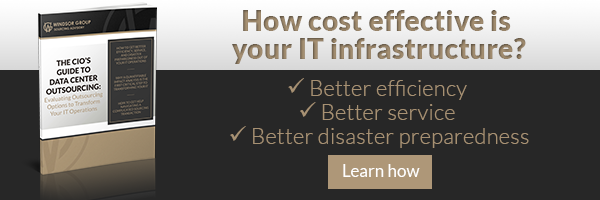 A data center consultant can give you as much or as little help as you want. But whether you’re looking for guidance with a comprehensive transformation or you need advice about a specific challenge you’re experiencing, you need the right data center consultant to get the most from your working engagement.
A data center consultant can give you as much or as little help as you want. But whether you’re looking for guidance with a comprehensive transformation or you need advice about a specific challenge you’re experiencing, you need the right data center consultant to get the most from your working engagement.
Putting some effort into finding that just-right data center consultant can exponentially increase your opportunities to learn and grow with their help. Asking these five questions will help you find the right fit.
1. What can you do for me?
It takes careful consideration to determine whether you should outsource all your functions, choose to outsource only selected services or stick with the status quo for now. Your consultant can assist with every aspect of data center decision-making, including:
- Assessing your current situation, the foundational element of any well-devised plan.
- Using your status assessment, data usage and corporate financial information to develop a high-level data center solution that fits your organization’s unique needs.
- Finding a service provider best able to handle your work and grow and change with your enterprise, and negotiating a results-oriented contract.
In addition to transformation planning, your consultant can assist with transition planning, to ensure new solutions are adopted smoothly and as painlessly as possible. You can also get help refining your retained internal functions, to streamline operations and reduce costs.
2. Where do you work?
A good data center consultant knows the territory, around the corner and around the world. Offshoring may be the most effective option for your needs, but perhaps not. Many large enterprises are actively repatriating services formerly outsourced to foreign countries, opting instead for solutions that are closer to home. They may have social and political reasons, but they’re also looking to facilitate better communication with providers.
You may also have company-specific cultural requirements. If you’re a big name and presence in your state, for instance, shopping local” could stand you in good stead with your customers, underscoring your company’s value as a good business neighbor.
As a matter of practicality, choose a data center consultant that can work independently and remotely but is also willing to work with you on site at your place of business as needed. If they aren’t flexible, they aren’t likely to focus on flexible solutions for you, either.
3. When will we see some answers?
Do-it-yourself outsourcing research can take forever. Your people have to make daily operations Priority #1 no matter what else you dish onto their plate. Given the complexity and seriousness of assessing data center alternatives, you can’t expect them to build the case for potential data center outsourcing in their “spare time.” And, frankly, they don’t have the tools and up-to-the-minute marketplace insight needed for this work.
Some consultants can also drag out the process unnecessarily, delaying the “time to market” for your data center decisions and implementation for many months. That can be costly. So ask data center consultant candidates about their approach, projected timeline, expected outcomes and costs up front, before you pick someone to work with.
4. Why should we hire you?
It’s imperative to link up with a data center consultant who has extensive, relevant knowledge and hands-on experience with your type of IT environment, maybe in your own industry, so you don’t waste time or risk miscommunication teaching them what’s important for you and why.
It’s equally imperative to choose a consultant with whom you feel personally comfortable. Working partnerships usually fail due to poor relationships, not technical factors.
5. How will my company benefit?
Identify your expectations ahead of time, and use them to direct the questions you ask each prospective data center consultant. Based on your goals, your advisor should help you develop a strong and reliable business case to compare outsourcing alternatives, tailor solutions to address near- and long-term needs, and ensure those solutions reduce operations costs and conserve capital funds.
Photo credit: Valerie Everett via Flickr


